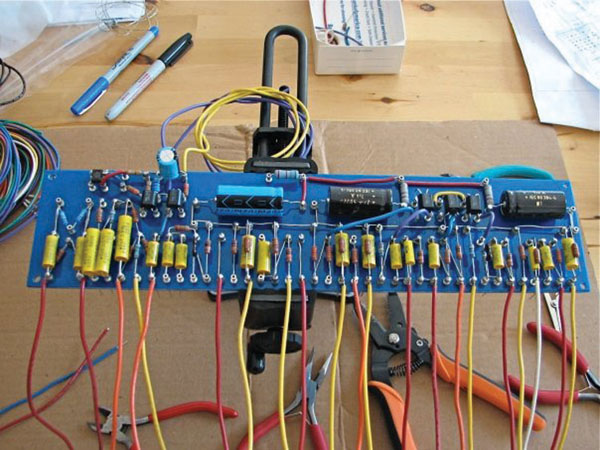 Image via performermag.com
Image via performermag.com
Music and the way we make it are ever-changing. Technology has opened the playing field for makers to turn their ideas into reality faster and at a lower cost than ever before. As a result, there are now guitar pedals, software synths, FX plug-ins, boutique guitars, analog synths, and drum machines in abundance. It’s not just technology, though, but a culture of openness, support, and enthusiasm that has enabled the boom of creation. Here are a few lessons musicians could learn from the people making their tools.
1. Follow your passion – money's never guaranteed
Every pedal maker I’ve ever met started in his or her spare time while working another job, and no one did it because he or she wanted to get rich. These people built pedals because they thought it was cool and made it a full-time job once enough customers started buying. There are many pedal builders who never make it their main source of income, and most of them are okay with that. Similarly, though it would be nice to butter your bread with your tunes, do it because you love it – not because you plan to live off of it.
2. Don't fear a niche
We live in a big world, and only a very small part of it is needed to make a company or band sustainable. By finding their niche, companies like Qu-Bit Electronix, Twisted Tools, and Metasonix have been able to thrive and innovate. They prove that there's an audience for the forward-thinking – but only for those courageous enough to find it.
3. Be more open
Most gear builders, like many musicians, are self-taught and love encouraging others to start learning. Guitar pedal maker Devi Ever posts her schematics and parts lists online for anyone to use and sells BIY (“build-it-yourself”) kits that just include the parts for a pedal. Giving away her intellectual property gives her greater interaction with customers and expands her community, which spreads the word about her great products. It also allows casually interested people to learn more about what she does. Bands that release remixes, sample packs, or share their favorite tips and tricks can likewise gain new audiences and influence the next generation of musicians simply by sharing some knowledge.
4. Get involved with your community
Fans of bands and brands alike love getting personal attention and will keep coming back for more. Audio Damage, a software and Eurorack module maker, is very active on social media, posting and responding to fans, the casually interested, and other makers. This drives traffic to and interest in their site and products and, combined with great customer service, leaves everyone with a great impression of the company.
5. Make friends with the "competition"
It’s hard to find ill will in the maker community. Spend time on any maker’s Facebook page or Muff Wiggler forum and you’ll see that the people behind each brand openly use and recommend products from their "competitors." This is because most makers have realized that music doesn’t get created in a vacuum and have embraced the fact that personal music rigs made from many sources are the best way to suit individual needs. If a competitor’s synth sounds amazing through my FX rig, it behooves me to let my fans in on the secret. Similarly, if I find that another band fits perfectly into a playlist with my band, letting people know helps expose both bands to new audiences and gets more listens for both of us.
Every musician should to go to a maker fair or tech meetup at least once to experience the DIY builder and hacker culture. In contrast to the stereotype of lonely, isolated geniuses working in dark basements, makers are usually friendly people who are excited to share their knowledge and passion with all who will listen. Spending time around enthusiasm is contagious – and that’s a bug worth catching.
Garrett Frierson wrote the "Meet Your Maker" monthly column in Performer Magazine for three years. He has a BA in Music Electronic Production & Design from Berklee College of Music and currently works as an engineer and producer in New York City.


